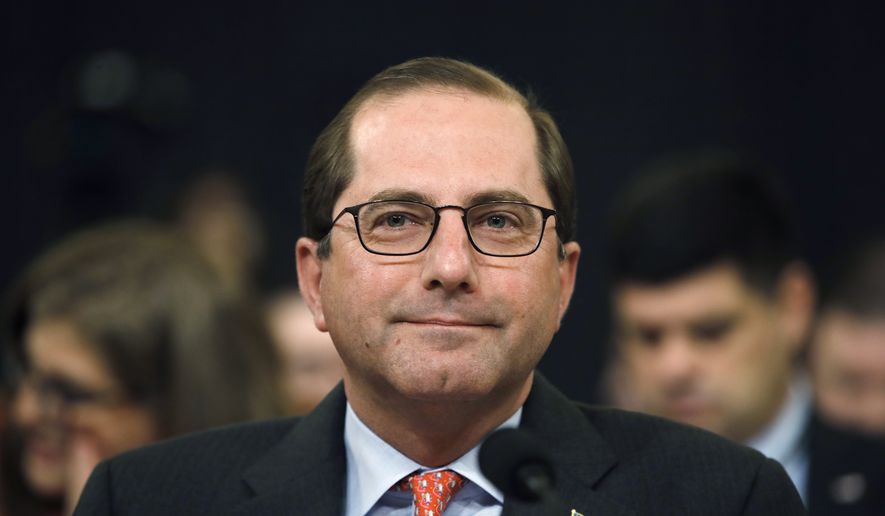The Trump administration moved Tuesday to give consumers another workaround to Obamacare, proposing to let health insurers sell full-year plans that don’t comply with the 2010 law’s strict coverage guidelines.
Under Obama-era rules, short-term plans can last only three months, but the Health and Human Services Department said it wants to allow plans up to a year.
People priced out of Obamacare’s exchanges would be enticed back into the market by affordable options, administration officials said — though critics said the move could deliver another serious blow to the Affordable Care Act by siphoning off current customers willing to pay less for skimpier plans.
HHS Secretary Alex Azar said the move would restore some balance to a system tilted too far to the poor and sick who were receiving government subsidies, while delivering sticker shock to healthier Americans left looking for plans on the individual market.
“We’ve got 28 million people still not insured. I think of those as the forgotten men and women of the Affordable Care Act, where that program has not been able to deliver affordable options for them,” Mr. Azar said.
Under his proposal, which he hopes to finalize this spring, full-year plans could duck Obamacare rules requiring robust coverage or preventing insurers from denying sicker patients or charging them more than healthy customers.
Prominent Republicans hailed the move as a much-needed step to expand consumer choice.
Yet Obamacare’s defenders cried “sabotage,” saying the move would open the door to “junk plans” and siphon healthy people from the program’s web-based exchanges.
Sick people who need robust coverage would remain in the exchanges and be forced to pay more, they warned, while taxpayers would have to shell out more for premium subsidies that rise with those rates.
Democrats also said some consumers might not know what they are signing up for, leading to financial distress when they realize their cancer diagnosis or pregnancy isn’t covered.
“Rather than offer more damaging rules and regulations that only hurt millions of American families, the administration should finally get in the business of working with both parties in Congress to improve our health care system,” said Senate Minority Leader Charles E. Schumer, New York Democrat.
The main insurers’ lobby was also skeptical of the plan.
“While we are reviewing the proposed rule to understand its impact on the people we serve, we remain concerned that expanded use of short-term policies could further fragment the individual market, which would lead to higher premiums for many consumers, particularly those with pre-existing conditions,” said Kristine Grow, spokeswoman for America’s Health Insurance Plans.
The move is the latest by an administration intent on blunting the demands of Obamacare. Last year, President Trump signed the tax cut bill that also removed the individual mandate requiring that Americans hold insurance. Earlier this year, the administration said it would consider letting states demand that some Medicaid recipients work toward getting jobs as a condition of their benefits.
HHS said short-term plans are critical lifelines for people who are in between jobs, leaving school or don’t like their current policies.
The department said Tuesday that it will decide, during a 60-day comment period of proposed rules, whether to let insurers renew the short-term plans beyond 12 months — prompting critics to worry that they will compete with Obamacare plans indefinitely.
The Obama administration imposed the three-month rule in 2016.
Obamacare ushered in a series of major changes to the individual insurance market. It required insurers to cover a slate of “essential health benefits” and mandated Americans to hold insurance or pay a tax, hoping to have federal taxpayers and healthy customers assume insurers’ financial risk when sicker people — who could no longer be denied insurance — were swept into the markets.
The law paid federal subsidies to low- and moderate-income consumers who might struggle to afford their monthly premiums.
Yet the program fell short of enrollment targets in the early rounds, leading to a relatively sick and pricey pool of customers. Insurers fled the program or raised rates, prompting millions of unsubsidized customers to complain that they were being forced to buy expensive plans they couldn’t afford or went beyond their needs.
Democrats say letting healthy enrollees walk to other options will only exacerbate the problem, so the administration should promote the exchanges or build on the program with more taxpayer-funded options.
Instead, Mr. Trump wants to repeal and replace Obamacare entirely, preferably by block-granting health care dollars to the states.
Tuesday’s action was the long-awaited sequel to Mr. Trump’s decision to let people who work similar trades to band together and buy “association” plans, which don’t comport with Obamacare’s strictures, across state lines.
HHS officials estimated that 100,000 to 200,000 people might defect from the Obamacare exchanges and into short-term insurance next year under the proposed framework.
It’s unclear how many people who lack coverage will opt for short-term insurance instead of Obamacare-compliant plans, though the administration said the proposal was drafted with them in mind.
“We believe this can be a meaningful option and alternative to Affordable Care Act plans for the right individuals,” Mr. Azar said.
HHS said people who opt for the skimpy plans would face fines on their tax returns next year, since repeal of the individual mandate doesn’t take effect until 2019.
• Tom Howell Jr. can be reached at thowell@washingtontimes.com.




Please read our comment policy before commenting.